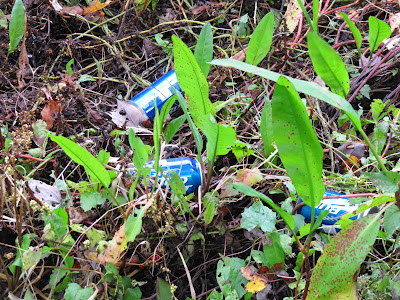
Yesterday I checked number 10 off my list at their Norris Reservation property. No less than a quarter mile into the area, I was transported out of the everyday suburban world. There were no cars and very few people. The sounds and scents were now those of the forest: the rush of wind through the trees, the pum of acorns falling on a soft trail, the caw of the crow. The air was full of moisture and pine.

The trail I initially took followed a river's edge. The high water table must make for shallow roots and unstable trees. I saw at least five tree falls where thin rounded shelves of roots were lifted skyward holding their soil exposing the stones and ground below.


A "boat house" (it contained no boats) sat along the trail as a perfect picnic or viewing spot. From it, I watched the swirling river water and waving fall-tinted grasses. Across the river private homes sat high on the hills. Small speed and party boats bobbed at the ends of docks jutting into the river. One of the homes at the edge of an inlet could have been my dream home with its charming decks, greenhouse and canoe by the water. It may have been the boat house of the larger house behind it. The view of these homes turned me a bit "green with envy" here in the woods.



But as I turned back to the trail my gratitude returned for this public space, its beauty available for all people and creatures. Not far ahead I saw a sign, figuratively and literally. About 9 to 10 feet up , an old sign was being consumed by the tree it had been posted on so long ago. On closer inspection I could discern the word "private" below the paint and rust. It was nearly obliterated.

Farther along, a side trail led to a pond with boardwalk paths that traversed its swampy edges. These environments with their thick low bushes and trees on tiny hills with their roots arching out of mud and pooled water are some of my favorites. They are thick with moss and ferns, shady, cool and damp.
Somehow in these places I can sit for long periods of time looking for birds and frogs. I can study the fractal patterns of lichen and consider the number of lobes of leaves or needles of pine clusters. The list of daily chores, calendar of important deadlines, and frustration with worldly events fade away.


Then I came upon the scattering of Bud Lite cans and Gatorade bottles. Frustration returned. Not only have kids come here to drink and likely drive off endangering others, but they left the ugly evidence of their crime. Why is it so hard for them to just carry the cans away? They could even use the 5 cent return deposit to buy more beer. I began to walk away dejected.
Then I turned back. It drives me crazy that the people who are willing to clean natural areas are never the ones who despoil them. But then again, if conscientious people don't do it, who will? I found a long stick, lay down perpendicular to the boardwalk hooking my feet on the far end for safety, and reached out with the stick as far as I could to bring within reach as many cans as possible. After a few minutes, I pulled about half the collection out of the tangled swamp plants. I hope someone with wading boots or long tools will come soon to retrieve the rest. I felt empowered if still disappointed continued on.


Along the trail on the way to my car, I see what looks like a natural temple. Large granite erratic stones left by the glaciers embedded so deep that the farmers who once tilled this land could not remove them. They sit near a clearing beckoning me to sit and be grateful for the beauty of our world and the gift of being healthy and able to take time to walk among the trees.
When I get home I watched an online interview with the poet and prophet, Wendell Berry. He spoke with Bill Moyers in front of a crowd of environmentalists and activists who clearly would never toss a can out their car window. They'd be the ones picking up the trash. But more than that, they'd be donating land or making laws to protect our remaining natural treasures. They'd be warning of the hazards of factory farming, going back to the land and creating small, sustainable farms. They'd be fighting against the Keystone Pipeline and using alternative energy. They'd say the true things that our compromised "leaders" in Washington would never say: that ""No amount of fiddling with capitalism to regulate and humanize it can, for long, disguise its failure to conserve the wealth and health of nature."
"It may be that the danger we've now inflicted upon every precious thing reveals the preciousness of it and shows us our duty." My duty today was to remove those cans from the swamp. It was... oh so small, but it was something. And by writing and speaking and blogging, perhaps we can convince more people to start caring and doing.
Please take a look at the Wendell Berry show from Moyers & Company.
1 comment:
we have to attain a state, in which we clean up the beer cans not *despite* those who have left them there, but entirely, wholly *for* the world they left them in.
Why is it so difficult? Maybe with practice it gets easier.
Post a Comment